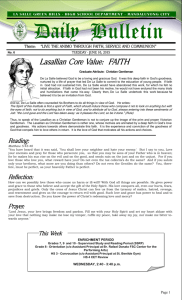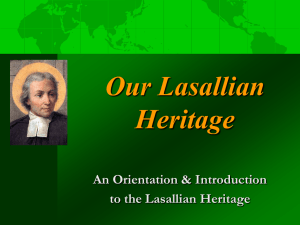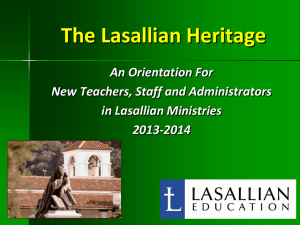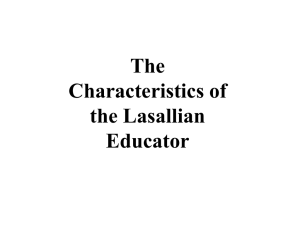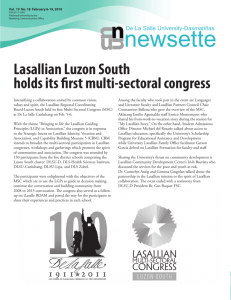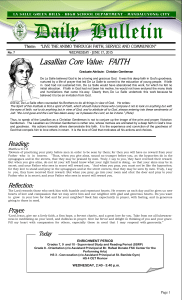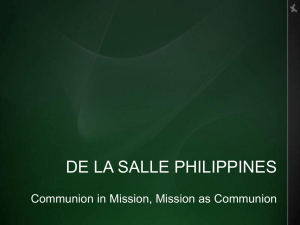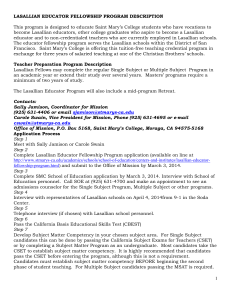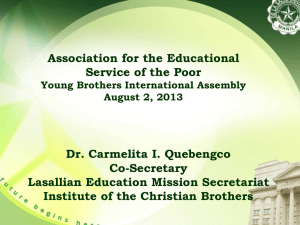Introduction to St. La Salle and Lasallian Schools
advertisement
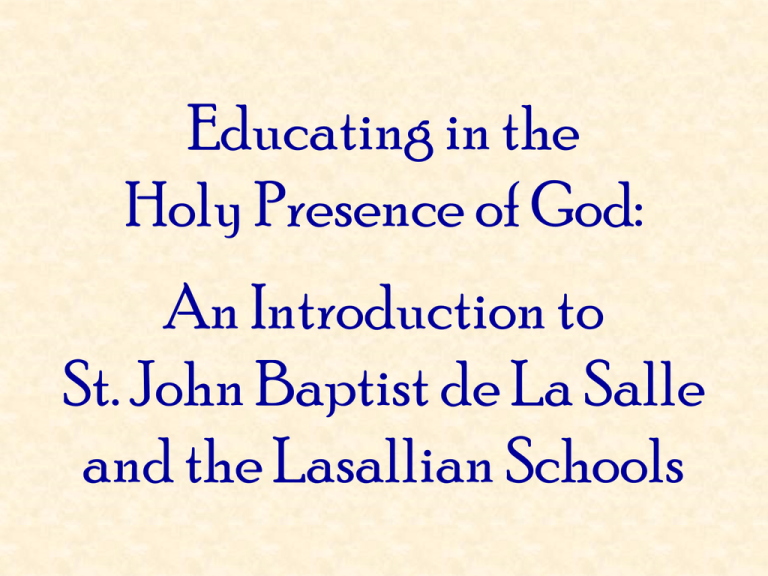
Educating in the Holy Presence of God: An Introduction to St. John Baptist de La Salle and the Lasallian Schools The 5 Core Principles Of Lasallian Schools Faith in the Presence of God. We believe in and are animated by the living presence of God in our students, our community, and our world. Concern for the Poor & Social Justice. We live and act in solidarity with the poor and advocate for all who suffer injustice. Quality Education. We instruct and guide our students to strive for scholastic excellence, to value life-long learning, and to be servant leaders. Inclusive Community. We welcome and celebrate diversity, fostering mutual acceptance, appreciation, and solidarity among all persons. Respect for All Persons. We honor the dignity of all persons, building and sustaining with others relationships of care, compassion, and love. Faith in the Presence of God: The Life of the Founder John Baptist de La Salle was born on April 30, 1651, in Reims, France. At age 11, he began his studies for the priesthood. At age 15, he was made a canon at the Cathedral of Reims. In 1670, De La Salle entered the seminary of Saint Sulpice in Paris. De La Salle was ordained a priest on April 9, 1678. In March of 1679, De La Salle met Adrien Nyel, a layman who was seeking help to establish a charity school for poor boys. De La Salle agreed to help and the charity school opened on the Rue Saint Maurice in Reims on April 15, 1679. Soon, public demand led to a second and then a third school opening. However, De La Salle soon realized that the schools were not prepared to run well. Adding to his dismay, Nyel bowed out of the project. De La Salle now had an unexpected and unwanted responsibility …and a decision to make. Torn, he spoke with his spiritual advisor, Father Nicolas Barre. What Barre had to say would stun De La Salle. On Easter, 1680, De La Salle invited the teachers to live in his home, where he began to train them in his vision of educating children. By the winter of 1683, De La Salle’s new “Christian Schools” were flourishing, but there was yet another step that De La Salle would need to take. In an extraordinary moment, De La Salle walked away from his world and plans, uniting himself irrevocably with the men and the mission of the fledgling schools. As word of the schools and the Brothers spread, it was clear that there had never been anything like them before. And it was only the beginning. The next 23 years would see continuous, almost startling, growth. However, there also would be severe challenges and painful setbacks. De La Salle was elected Superior General in 1694. He began writing special training texts for the Brothers and continued to direct their professional and spiritual formation. By 1717, De La Salle was content to be the Brothers’ chaplain and worked with the novices, as well as with the students at Saint Yon, the Brothers’ reformatory. After a series of illnesses, De La Salle died on April 7,1719. His last words were “I adore in all things the holy will of God in regard to my life.” On May 24, 1900, Pope Leo XIII canonized John Baptist de La Salle a saint of the Roman Catholic Church. On May 15, 1950, Pope Pius XII named him Patron of All Teachers of Youth. Concern for the Poor & Social Justice: The Mission The Lasallian Mission can be characterized as an apostolic ministry of the Roman Catholic Church that is committed to giving a human and Christian education to the young, especially the poor and marginalized, for the purpose of their salvation. From the original Rule: “The purpose of this Institute is to give a Christian education to children and it is to this end that the Brothers keep schools. Having the children under their care from morning until evening, they teach them to lead good lives by instructing them in the mysteries of our religion and by inspiring them with Christian maxims, thus giving them a suitable education.” The Lasallian Movement, past and present, is driven by De La Salle’s “charism,” or original spirit and vision. The enduring elements of De La Salle’s charism are: providing a human and Christian education to all youth, especially the poor and marginalized, in ministries conducted as places of salvation, by professionals acting together and by association for the sake of this mission. Respect for All Persons: The Schools From the beginning, the Lasallian Schools were places with a clear, direct, and prophetic mission. Their original characteristics remain their hallmark. Lasallian Schools were Catholic, established primarily to serve the Church’s mission to proclaim the Gospel of Jesus Christ and to help build God’s Kingdom. Lasallian Schools were salvation-centered, established primarily to be “cooperators with Jesus” in leading students to experience God’s saving presence in their lives. Lasallian schools were gratuitous and egalitarian, established primarily to care for the poor and working class but open to all. Lasallian Schools were transformational, established primarily to bring students to a knowledge of God that would open their eyes and change their lives. Quality Education: The Teacher The characteristics of the original Lasallian schools were sustained by the Teacher through three means. First, through the person of the teacher: the Brothers acted as “ambassadors of Christ,” bringing God’s love to the students through their caring and vigilant relationships with them. Second, through the mentorship of the teacher: The Brothers provided a “human and Christian and education” that would enable students to live with the dignity and virtue that God intended. Third, through the example of the teacher: the Brothers embodied for the students an ethos of solidarity and shared vision rooted in the Gospel’s call to love, compassion, and justice. The Twelve Virtues of a Good Teacher Written by Brother Agathon, the fifth Superior General of the Brothers of the Christian Schools (1777 – 1795), The Twelve Virtues of a Good Teacher are a concise and insightful synthesis of the “best characteristics and practices” for teachers found throughout the writings of St. John Baptist de La Salle. According to internationally-renowned Lasallian scholar Brother Gerard Rummery, “The Twelve Virtues of a Good Teacher is, in my view, after the monumental text we know as The Conduct of Schools, the most significant work in education in the Lasallian heritage.” Gravity (la gravité) Purposefulness; self-discipline. The Lasallian teacher is dignified and professional. Silence (le silence) Centeredness; thoughtfulness. The Lasallian teacher is calm and prepared. Humility (l'humilité) Modesty; simplicity. The Lasallian teacher is gracious and honest. Prudence (la prudence) Sensibility; reasonableness. The Lasallian teacher is discerning and judicious. Wisdom (la sagesse) Sagacity; enlightenment. The Lasallian teacher is knowledgeable and insightful. Patience (la patience) Composure; even-temperedness. The Lasallian teacher is compassionate and understanding. Reserve (la retenue) Restraint; circumspectness. The Lasallian teacher is discrete and well-mannered. Gentleness (la douceur) Compassion; reverence. The Lasallian teacher is reassuring and healing. Zeal (le zèle) Devotedness; keenness. The Lasallian teacher is enthusiastic and tireless. Vigilance (la vigilance) Care; watchfulness. The Lasallian teacher is present and diligent. Piety (la piété) Reverence; virtuousness. The Lasallian teacher is faith-filled and prayerful. Generosity (la générosité) Unselfishness; kindness. The Lasallian teacher is giving and nurturing. Inclusive Community: The Students De La Salle’s first and main concern for the students of his schools was that they were “far from salvation.” To remedy this was the raison d’etre for Lasallian education. All Lasallian students were to know that they are loved by God and that they are called to live with the dignity and purpose that befits a child of God. The Lasallian school would be known by its inclusive and familial relationships: students as siblings and mentors to each other and teachers as older siblings and mentors to their students. Lasallian students discover themselves through their relationship with God and with others. They discover the world and their role in it through faith, learning, service, and leadership. “To touch the hearts of your students and to inspire them with the Christian spirit is the greatest miracle you can perform and one which God expects of you, for this is the purpose of your work.” St. John Baptist de La Salle Patron of All Teachers of Youth St. John Baptist de La Salle, pray for us. Live Jesus in our hearts forever!

